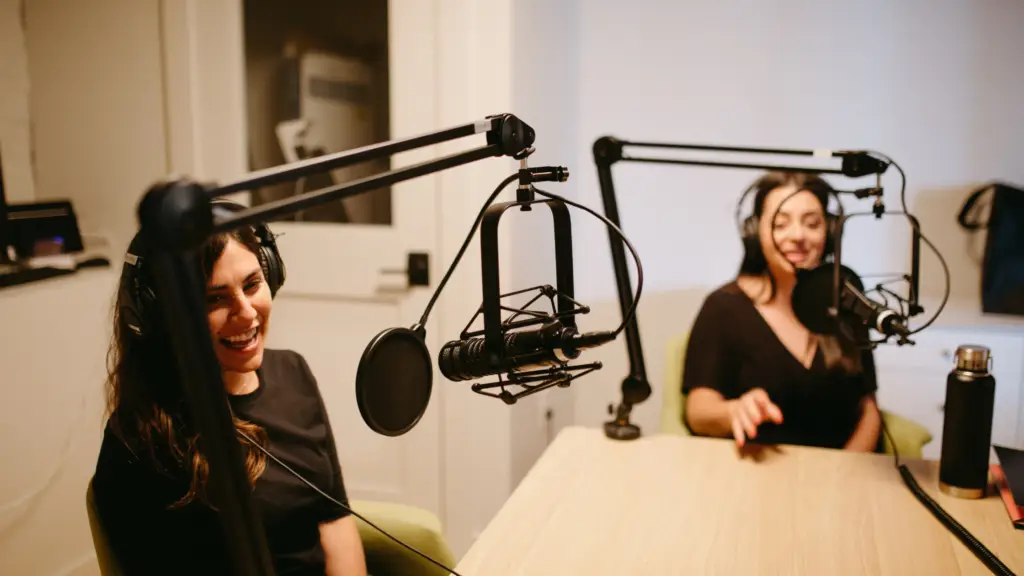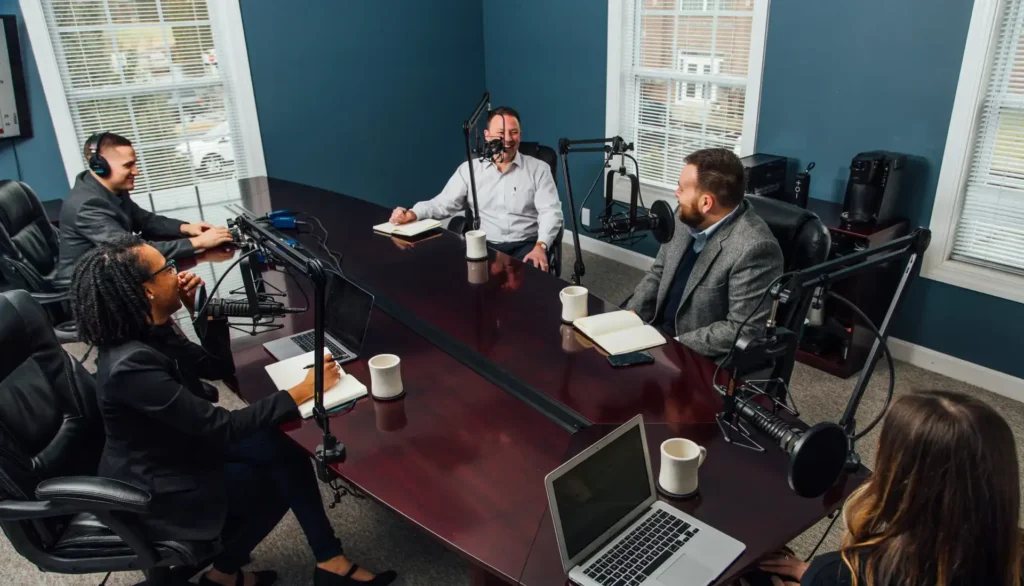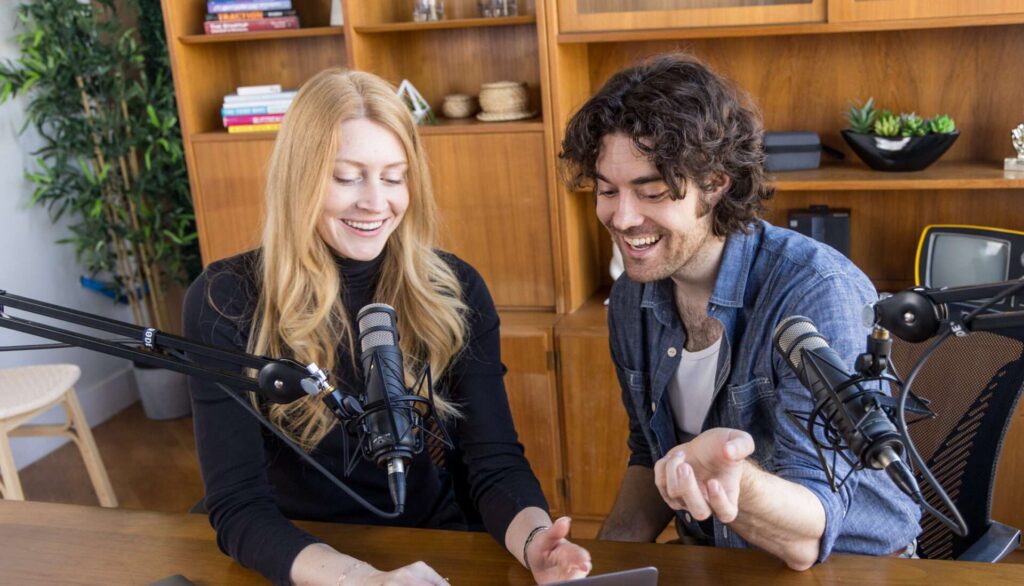Updated March 6, 2024 / Posted January 14, 2022 / Whitney Bozarth
Quick Note: Some of the links in this blog may be affiliate links which will give us a small commission fee (at no extra cost to you).
Brands like Honda, Trader Joe’s, and Sephora are just a few that have joined the podcasting nation!
One of the beautiful things about podcasting is that it’s not limited to entertainers and public figures. Anyone can have a podcast, including businesses and brands! In fact, they should.
Podcasting is a lasting trend in communication and marketing
Through the past few years, we’ve seen more and more household-name brands come onto the podcasting scene, including Honda, Trader Joe’s, and Sephora.
What is a branded podcast?
A branded podcast is a podcast created to promote a brand or organization either directly, or indirectly, by entertaining, informing, or serving an audience. Every year, more brands are launching podcasts, sponsoring existing podcasts, or acquiring podcasts to build brand awareness with these audiences.
Recommended reading: The 10 best branded podcasts (and 9 reasons to start one)
How do businesses use podcasts?
There are three main approaches that most organizations take to create a branded podcast.
Branded Podcasts
Inside Trader Joe’s is a podcast that offers people an inside look into what it takes to run a grocery store. This strategic peek behind the curtain serves the function that most branded podcasts do: create effective marketing for the company’s specific initiatives while serving a broader branding goal of humanizing the company.
For an example, see the episode about how Trader Joe’s determines prices for products.
Internal podcasts
WeAreNetflix is one example of this kind of podcast, which may be public or employees-only. You can spot an internal podcasts by its name, which tends to either speak to a unifying team-building sentiment for employees (the Netflix one is a good example), an employee-directed communication coming from upper management (American Airlines’ Tell Me Why), or just the company culture (Life at Spotify).
Although these podcasts are ostensibly about employee education, a publicly released internal podcast can also double as a branded podcast that customers can listen to.
Sponsored podcasts
Companies like Hubspot and Stripe have set a precedent by acquiring entire podcasts. This practice allows companies to go beyond simply serving ads and instead own an entire channel and audience, running ads in the shows and adding their logo to the cover art. You can see this in shows like Market Your Genius and My First Million.
Why a Podcast Can Help Your Business
Podcasting can be a powerful tool for your business. Not only does it encourage brand loyalty, but can even grow your customer base. You must have a clear reason and goal, set realistic expectations, and use podcasting intentionally to connect with listeners in a personable way.
With a little patience, some practice, and a clear vision, your business can be on its way to a successful podcast. Here are a few reasons that many businesses have jumped on the podcast train:
It’s a medium that current and future customers are listening to
Podcasting is continuing to grow in popularity, so there is an opportunity for your business to reach those people!
It builds brand identity through storytelling and education
Podcasting provides a unique opportunity for both your company and other industry experts to dive deeper into topics related to your field.
The hosts and guests can also share compelling stories related to the business, an indirect way of establishing a trusting relationship with customers.
It’s a cost-effective way to engage your audience for 30-45 minutes
In comparison with other forms of advertising (i.e. PPC, tv commercials, radio ads, etc.) podcasting can be done very cheaply.
Podcasting has one of the best levels of engagement of any medium. A high percentage of every age demographic regularly listens to podcasts. 80% of listeners finish all or most of each episode they start.
So, you can get the attention of listeners for 30-45 minutes on your podcast. That’s unheard of on YouTube, blogs, and other platforms.
It’s an easier alternative to video production
While video podcasts are certainly popular, they may not be the right fit for your business. Audio-based podcasts are easy alternatives to high-end video projects and involve minimal setup. Plus you can do it in your pajamas and no one would know–who wouldn’t love that?!
It’s a networking tool for meeting other industry leaders
Businesses are increasingly leveraging podcasting to collaborate and connect with other industry leaders. This in turn showcases your business to a new audience.
How often do you listen to a guest on a podcast you enjoy, only to then go and research them more afterward?
Maybe you even bought a product from them or signed up for a service, or at the very least followed them on social media.
If you’re one of those people wondering if a podcast for your business could be a good idea, chances are it is!
Not convinced yet? Read even more reasons for starting a branded podcast in our guide to the 10 best branded podcasts.
After working with a myriad of businesses and brands to help them create their company podcasts, here is a snappy list of some do’s and don’ts for your business podcast that can help you get off on the right foot.
9 Do’s and don’ts for every business podcast
Don’t treat your podcast like a long commercial
Treating your business podcast like a commercial of constant advertisement for your company will likely be a turn-off for listeners. A business podcast is more or less already marketing content for building your brand, so an audience wants more from your podcast than something they can get from your social media campaigns.
DO engage in storytelling
Storytelling is one of the most crucial parts of a brand’s messaging that affects customer relationships. Still, it is all-too-often underused! Podcasting is a perfect platform to share stories and cast the net broader than you can with a radio or TV commercial.
A company that specializes in outdoor gear could highlight customer stories about notable outdoors adventures, with the customers themselves sharing their experiencesn on the podcast.
For a real-world example, check out Honda Stories. This branded podcast promotes Honda by telling stories about how customers use its products!
Recommended reading: The 20 Best Business Podcasts of 2024
Don’t skimp on production quality
Your show doesn’t need fancy bells and whistles to reach its goal. However, it should at least sound good, as production quality is important to maintain listeners.
DO invest in quality production
While some hobbyist podcasters get by with minimal editing or shabby audio quality, you don’t want your business podcast becoming affiliated with poor production quality. A listener may wonder what else the business does cheaply.
Taking the time to invest in your production quality communicates that you’re committed and invested in the podcast. This in turn sends a message that the podcast is worth someone’s time and attention.
Recommended reading: The ultimate podcast editing guide
Don’t go in without a plan
Like any other marketing and communication strategy, having a strategy for your podcast is important in shaping your messaging.
Add that to the fact that podcasting can be hard work, especially at first.
Consider how your podcast can benefit your audience, rather than just your brand. Also, find out whether the podcast can creatively tie in with the brand’s other established endeavors while maintaining a unique voice that connects with your audience.
DO know your ‘why’
The reason your company or brand starts a podcast shouldn’t be because everyone else is doing it or just to build brand awareness. It takes more than that to create compelling content that people want to listen to.
Personableness and value are essential to a good podcast. At the end of the day, your passion must come through to your audience. Otherwise, listeners won’t get anything more than chatter about your brand, and probably won’t listen to episode 2.
Have both a clear purpose for why you want to do the podcast in the first place (what’s in it for your business?) and a plan for how you will provide value to your listeners (what will listeners get out of it?). Doing so helps you create an effective content strategy and determine appropriate goals.
Recommended reading: How to start a podcast (7 steps)
Don’t assume the CEO needs to be the host
While a company’s CEO can be a perfect host for a podcast for your business, it doesn’t have to be the CEO.
Often the CEO’s schedule is very demanding, with limited time for preparing or even scheduling interviews.
If having your CEO on the podcast is important to your business, consider having the CEO be a guest (perhaps a recurring one) on the show and share the podcast episodes on the CEO’s social platforms. Selecting a host involves considerations of personality, availability, and conversational dynamic rather than merely who has the most followers or name recognition.
Recommended reading: Top 18 tips for being a good podcast host
DO cross-promote
A common frustration is the amount of time it can take for a podcast to gain traction. A business starting its first podcast is unlikely to end up in Apple or Spotify’s top charts any time soon.
It takes time, energy, and consistency to build an audience and intentionality to market the podcast specifically in order to gain recognition and notability amongst your audience.
Cross-promotion can be a very helpful tool in building this audience. Make sure your podcast is mentioned in all of your online platforms. You can also consider collaborating with others in your field/industry who can help spread the word of the podcasts.
Recommended reading: How to promote a podcast
One more thing… DO give it time!
Podcasting is still a new medium compared to other online platforms. A huge learning curve exists from starting a show to launching and maintaining it.
The important thing to keep in mind is that while you may be an expert in your field, you will be a learner when it comes to podcasting. When you see your analytics and the numbers aren’t as high as you hoped they would be out of the gate, don’t give up. Use it as a learning opportunity. Be curious about the analytics. Experiment. Try new things as a host. Try new things to market your podcast. And give yourself time.
💡 Pro Tip: Download our comprehensive Podcast launch checklist for free.
How to start a business podcast
The process will be different for each company, but there is some general advice that we have.
The first is to work out the theme and format ahead of time. Even if you experiment with and alter these things going forward, the beginning episodes should not sound like you are figuring it out as you go along.
Once you know what you want the podcast to be, look into your recording options. Video podcasts are growing in popularity, but they are definitely more expensive to produce than the audio-only alternative.
Choosing a podcast production company can be worth the investment. If you do not have podcast-production equipment at the ready, you may balk at the upfront cost of quality gear.
Additionally, both the production and post-production process is time-intensive. With a good production company, you can pretty much just show up, sit down, and not even have to worry about pressing “record”–all you need to do is talk for the allotted time, then wait for the production company to bring the finished product to you for approval.
Also, work out a release schedule ahead of time and do not immediately release your first episode as soon as it is ready. Instead, it is wise to always have multiple episodes on the ready so that you can create a consistent listenership that can depend on your podcast episodes dropping weekly, biweekly, monthly, or whatever release-frequency you choose.
For an even more detailed outline, read our blog on how to start a podcast in 7 steps. Podcast Production for Business Owners
Are you thinking about starting a branded podcast for your business? Download our free guide on how to start a podcast or schedule a call with our team to learn about how we can help bring your podcast to life.











